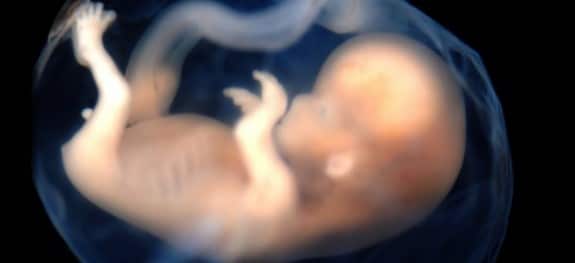While some studies have claimed that it is “safe” to consume moderate amounts of alcohol during pregnancy, there is still a cold, hard truth when it comes to alcohol consumption during pregnancy: no one can say for certain how much must be consumed before the damage is done. After using a new imaging method, scientists now believe they are one step closer to proving that even one drinking episode could endanger a developing fetus.
“Alcohol-induced congenital heart defects are frequently among the most life-threatening and require surgical correction in newborns,” the Case Western Reserve University research team, led by Ganga Karunamuni, Ph.D., told Medical News Today.
According to the team, studies like this have been very limited, which means there is little information in the way of alcohol consumption during pregnancy and the effect it has on the developing heart of a fetus. Using optical coherence tomography, (a new technology that works a lot like an ultrasound, but returns high-resolution images on the micron scale and light instead of sound) they took a look at tiny embryotic hearts exposed to alcohol and compared them with hearts that hadn’t. What they found may rival every shred of doubt that alcohol has a negative effect on an unborn baby.
“Few studies have addressed the influential role of altered cardiac function in early embryogenesis, due to a lack of tools with the capability to assay tiny beating hearts,” the researchers said.
Of course, they couldn’t intentionally expose human embryos to alcohol, so they used quail eggs to test the effects of alcohol on a developing heart. According to the study authors, the hearts of these birds develop similarly to those of humans.
Eggs were separated into two groups – those whose eggshells that had been given one large dose of alcohol, and those that had not. Researchers said that the amount of alcohol given to the test group was “proportional to the amount that would be considered a single episode of binge drinking in a pregnant woman.”
During the gastrulation stage – a very early embryonic stage when the heart switches from a tube shape to a loop shaped circuit, researchers used their imaging tools to look through layers of heart tissues. It occurs shortly after ovulation, after the embryo has turned from a ball of cells, but still has yet to form the primitive neural tube that will eventually become the spinal cord and brain. Researchers said that, in this time of development, embryos are extremely sensitive to the induction of birth defects, particularly those of the heart.
Findings showed that heart blood flow patterns and anatomy of the hearts were different in the hearts of eggs exposed to alcohol. The early differences in blood flow led to a larger portion of blood flowing through the heart after each beat, resulting in a condition known as regurgitant flow. Early structural differences were also found to result in smaller “atrio-ventricular cardiac cushions” – the collection of cells that later form the heart’s chamber walls and valves. Researchers were able to link these differences to expected birth defects that were subsequently found in the fully developed hearts.
“The dramatic defects close to hatching” included thinner walls that separated the four heart chambers and damaged heart valves. In other words, the exposed eggs developed late-stage valvuloseptal defects – defects that would likely require surgery if found in a human heart.
According to the authors, this study, along with others in the background to their study, show that the heart’s early development can be affected by cells responding to “mechanical forces of blood flow.” Essentially, the faulty function that happened after the alcohol exposure could steer the developing organ in the wrong direction in the later stages of development, “setting the stage for larger defects to arise.”
In conclusion, the authors said that more is needed to better understand how alcohol affects a developing fetus – not just regarding heart defects, but also in the way of fetal alcohol spectrum disorders (a life-long condition that can lead to cognitive, developmental and physical defects of varying degrees).
“With an average of 4 million US pregnancies per year, there will be approximately 10,000 cases of alcohol-induced congenital heart defects,” the authors said. “Continued study of the mechanisms involved in the development of alcohol-induced cardiac birth defects is warranted in order to implement effective treatments and/or prevention strategies.”
Related Articles:
- Study: Vitamin D Levels during Pregnancy Linked to Improved Muscle Strength in Toddlers
- Researchers Encourage Parents to Set Rules on Media Usage at Mealtimes
- EXIT Surgery Saves Little Girl’s Life by Helping Her Breathe after Delivery







